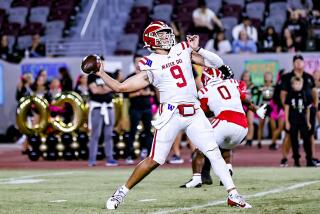Is There Life After Football? : Former College, High School Players Give Up Pads, Helmets to Tackle Rugby
- Share via
Nolan Day has played rugby in 12 countries during the past decade and that, he says, has helped him learn two things about the San Fernando Valley:
1) Some of the sport’s hardest tacklers live in the Valley; 2) it hurts when they hit you.
“I’ve never been hit as hard anywhere as I have in the United States,” said Day, 31, whose strong, muscular physique and short, stout arms befit someone who appreciates contact sports.
Day has several theories for what makes U. S. rugby players so aggressive.
“With our background in gridiron football, players in this country are taught to tackle in a different way that’s much harder on the body,” said Day, of Van Nuys. “The British, for example, play a more finesse game, more instinctive and not as physical.”
Day would know about both football and rugby. Ten years ago, he played defensive back at Cal State Northridge, where he took up rugby to stay in shape during the off-season.
But when his football days ended, Day stayed with rugby and is now the captain of the Eagle Rock Athletic Club team. The club, founded in 1937 by the late Boris Karloff, is the oldest rugby club in Southern California.
Like Day, most of the players on the team live in the Valley and are former high school or college football players. But they never got the thrill of a contact sport out of their system.
Bob Manoukian, 28, of Studio City, is one of those. He played football at Grant High and plays basketball to keep in shape for rugby.
On the Eagle Rock team, he plays scrum-half, a position similar to football’s quarterback. He is strong and lean, and his low center of gravity makes him a natural for the position.
Manoukian is responsible for advancing the ball downfield by either running, throwing lateral or backward passes, or kicking. Forward passes are not allowed in rugby.
“In the type of rugby I like to play, you should never be hit,” Manoukian said. “You’re supposed to dish it off before you get hit. But there are a lot of big guys with attitudes out there who just want to stick you.”
One of the biggest differences between rugby and football is that everyone participates in the scoring in rugby. Any player is eligible to advance the ball downfield or score.
“For someone who never got to touch the ball in college football, it’s a nice change to be passing and scoring,” Day said.
As in football, a team’s forward motion is stalled when a player is either tackled or loses possession of the ball. Injuries are less frequent in rugby, however, because blocking is not allowed and neither helmets nor pads are worn. Without a helmet, a rugby player is less apt to bury his head in an opponent’s stomach.
“No matter how tough I think I am, if I’m not wearing a helmet, I don’t want to put my head into somebody’s knee,” Day said.
Yet, while rugby players might not be as eager as football players to take off an opponent’s head, hard tackling and hitting is a mainstay of the sport. Day said that often leads to misconceptions about the athletes.
“People have the impression that rugby players are ruffians, guys who have a barbaric nature,” Day said. “The players on our team have a common bond almost as strong as any fraternal organization because we’re all involved in such a hard game.”
It’s that camaraderie, and the game’s competitive aspect, that has kept Day and rugby together for more than 12 years. Day’s team plays locally at Balboa Park or Hjelte Sports Center in Encino. It often uses a soccer or football field instead of the standard, slightly larger rugby field, which is approximately 110 yards long by 75 yards wide.
Scoring in rugby is similar to football. A team scores four points, or a try, when a player touches the ball in an opposing end zone or try zone. A conversion is worth two points and must be placekicked off the ground between two uprights 18 feet apart and over a 10-foot-high crossbar, located at both ends of the field. The kicker decides on the angle and distance.
Day’s team plays two versions of rugby. Seven-man rugby is played during August and September as a prelude to the 15-man season, which runs from October through April.
The Eagle Rock team will play host to a seven-man rugby tournament at the Rose Bowl on Aug. 30-31 with more than 30 teams from throughout California scheduled to compete.
The Eagle Rock team is also scheduled to tour South America next July.
More to Read
Get our high school sports newsletter
Prep Rally is devoted to the SoCal high school sports experience, bringing you scores, stories and a behind-the-scenes look at what makes prep sports so popular.
You may occasionally receive promotional content from the Los Angeles Times.






